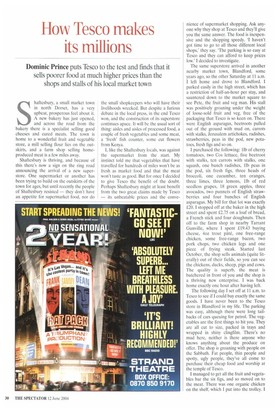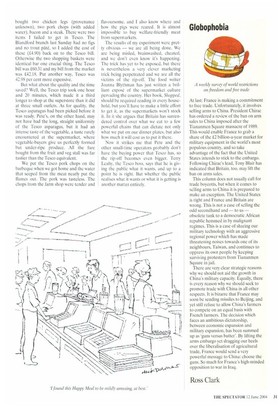How Tesco makes its millions
Dominic Prince puts Tesco to the test and finds that it sells poorer food at much higher prices than the shops and stalls of his local market town Shaftesbury, a small market town in north Dorset, has a very upbeat, prosperous feel about it. A new bakery has just opened, and across the road from the bakery there is a specialist selling good cheeses and cured meats. The town is home to a wonderful fruit and vegetable store, a mill selling flour lies on the outskirts, and a farm shop selling homeproduced meat is a few miles away.
Shaftesbury is thriving, and because of this there's now a sign on the ring road announcing the arrival of a new superstore. One supermarket or another has been trying to build on the outskirts of the town for ages, but until recently the people of Shaftesbury resisted — they don't have an appetite for supermarket food, nor do the small shopkeepers who will have their livelihoods wrecked. But despite a furious debate in the local press, in the end Tesco won, and the construction of its superstore continues apace. It will be the usual sort of thing: aisles and aisles of processed food, a couple of fresh vegetables and some meat, a 'fresh' fish counter, some cut flowers from Kenya.
I, like the Shaftesbury locals, was against the supermarket from the start. My instinct told me that vegetables that have travelled for hundreds of miles won't be as fresh as market food and that the meat won't taste as good. But for once I decided to give Tesco the benefit of the doubt. Perhaps Shaftesbury might at least benefit from the two great claims made by Tesco — its unbeatable prices and the conve nience of supermarket shopping. Ask anyone why they shop at Tesco and they'll give you the same answer. The food is inexpensive and the shopping speedy. 'I haven't got time to go to all those different local shops,' they say. 'The parking is so easy at Tesco and they can afford to keep prices low.' I decided to investigate.
The same superstore arrived in another nearby market town, Blandford, some years ago, so the other Saturday at 11 a.m. I left home and drove to Blandford, I parked easily in the high street, which has a restriction of half-an-hour per stay, and sauntered down to the market square to see Pete, the fruit and veg man. His stall was positively groaning under the weight of loose-sold fruit and veg, free of the packaging that Tesco is so keen on. There were English asparagus, beetroots pulled out of the ground with mud on, carrots with stalks, Jerusalem artichokes, radishes, strawberries, peas in the pod, new potatoes, fresh figs and so on.
I purchased the following: 11b of cherry tomatoes, two Cos lettuce, five beetroot with stalks, ten carrots with stalks, one squash, one bunch radishes, 1lb peas in the pod, six fresh figs, three heads of broccoli, one cucumber, ten oranges, three limes, three lemons, lib of red seedless grapes, 18 green apples, three avocados, two punnets of English strawberries and four bunches of English asparagus. My bill for that lot was exactly £20. I stopped off at the baker in the high street and spent £2.75 on a loaf of bread, a French stick and four doughnuts. Then off to the farm shop in nearby Tarrant Gunville, where I spent £19.43 buying cheese, 4oz trout pâté, one free-range chicken, some free-range bacon, two pork chops, two chicken legs and one piece of frying steak. Started last October, the shop sells animals (quite literally) out of their fields, so you can see the chickens, ducks, sheep, pigs and cows. The quality is superb, the meat is butchered in front of you and the shop is a thriving new enterprise. I was back home exactly one hour after having left.
The following day I set off at 11 a.m. to Tesco to see if I could buy exactly the same goods. I have never been to the Tesco store in Blandford in my life. The parking was easy, although there were long tailbacks of cars queuing for petrol. The vegetables are the first things to hit you. They are all cut to size, packed in trays and wrapped in shiny clingfilm. There's no mud here, neither is there anyone who knows anything about the produce on offer. The shop is groaning with people on the Sabbath. Fat people, thin people and spotty, ugly people, they've all come to purchase their cheap food and worship at the temple of Tesco.
I managed to get all the fruit and vegetables bar the six figs, and so moved on to the meat. There was one organic chicken on the shelf, which I put into the trolley. I
bought two chicken legs (provenance unknown), two pork chops (with added water), bacon and a steak. There were two items I failed to get in Tesco. The Blandford branch last Sunday had no figs and no trout pate, so I added the cost of these (£4.90) back on to the Tesco bill. Otherwise the two shopping baskets were identical bar one crucial thing. The Tesco bill was £60.31 and my bill from the market was £42.18. Put another way, Tesco was 42.98 per cent more expensive.
But what about the quality and the time saved? Well, the Tesco trip took one hour and 20 minutes, which made it a third longer to shop at the superstore than it did at three small outlets. As for quality, the Tesco asparagus had been picked before it was ready. Pete's, on the other hand, may not have had the long, straight uniformity of the Tesco asparagus, but it had an intense taste of the vegetable, a taste rarely encountered at the supermarket, where vegetable-buyers give us perfectly formed but under-ripe produce. All the fare bought from the fruit and veg stall was far tastier than the Tesco equivalent.
We put the Tesco pork chops on the barbeque when we got home and the water that seeped from the meat nearly put the flames out. The pork was tasteless. The chops from the farm shop were tender and flavoursome, and I also know where and how the pigs were reared. It is almost impossible to buy welfare-friendly meat from supermarkets.
The results of my experiment were pretty obvious — we are all being done. We are being misled, brainwashed, cheated, and we don't even know it's happening. The trick has yet to be exposed, but there is nevertheless a very clever marketing trick being perpetrated and we are all the victims of the rip-off. The food writer Joanna Blythman has just written a brilliant exposé of the supermarket culture pervading the country. Her book, Shopped. should be required reading in every household, but you'll have to make a little effort to get it, as the supermarkets won't stock it. In it she argues that Britain has surrendered control over what we eat to a few powerful chains that can dictate not only what we put on our dinner plates, but also how much it will cost us to put it there.
Now it strikes me that Pete and the other small-time operators probably don't have the buying power that Tesco has, so the rip-off becomes even bigger. Terry Leahy, the Tesco boss, says that he is giving the public what it wants, and up to a point he is right. But whether the public realises what it wants or what it is getting is another matter entirely.



















































































 Previous page
Previous page